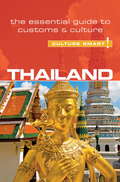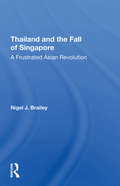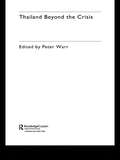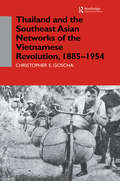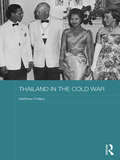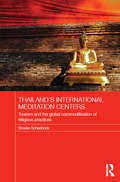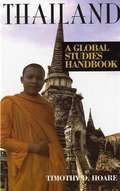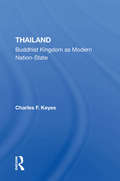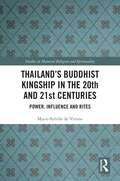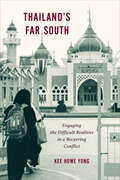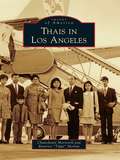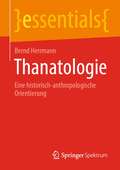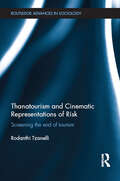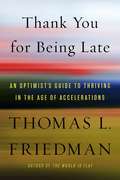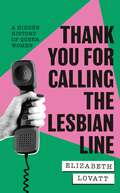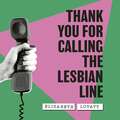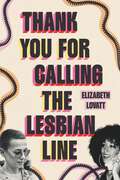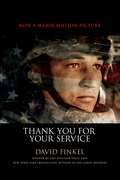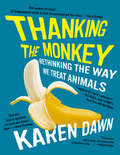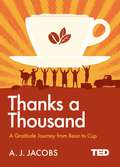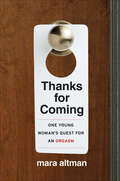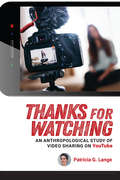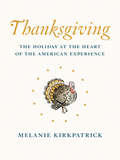- Table View
- List View
Thai Ways
by Denis SegallerWritten by an Englishman who has spent most of his adult years in Thailand, the pieces in this collection were originally published as columns in Thailand's English-language newspaper. Topics include language, food, festivals, worship, the calendar, and "do's and don'ts" for visitors. This book will be of value to anyone planning a trip to Thailand or anyone who wishes to learn more about the country.
Thailand - Culture Smart!
by Roger JonesCulture Smart! provides essential information on attitudes, beliefs and behavior in different countries, ensuring that you arrive at your destination aware of basic manners, common courtesies, and sensitive issues. These concise guides tell you what to expect, how to behave, and how to establish a rapport with your hosts. This inside knowledge will enable you to steer clear of embarrassing gaffes and mistakes, feel confident in unfamiliar situations, and develop trust, friendships, and successful business relationships. Culture Smart! offers illuminating insights into the culture and society of a particular country. It will help you to turn your visit-whether on business or for pleasure-into a memorable and enriching experience. Contents include * customs, values, and traditions * historical, religious, and political background * life at home * leisure, social, and cultural life * eating and drinking * do's, don'ts, and taboos * business practices * communication, spoken and unspoken "Culture Smart has come to the rescue of hapless travellers." Sunday Times Travel "... the perfect introduction to the weird, wonderful and downright odd quirks and customs of various countries." Global Travel "...full of fascinating-as well as common-sense-tips to help you avoid embarrassing faux pas." Observer "...as useful as they are entertaining." Easyjet Magazine "...offer glimpses into the psyche of a faraway world." New York Times From the Trade Paperback edition.
Thailand And The Fall Of Singapore: A Frustrated Asian Revolution
by Nigel J BraileyFocusing on the period between 1932 and 1968, this comprehensive study bridges the gap between recent political studies and available historiography, which generally conclude with the 1932 revolution. Dr. Brailey discusses the 1942 Japanese capture of Singapore that dragged a reluctant Thailand into World War II—a war Thai leaders believed was irrelevant to their national interests. He argues that this country, which had launched one of the East's earliest nationalist revolutions, had its political development reversed for a quarter century by the arrival of Japanese troops. Ironically, the Japanese presence in the region enabled most of Thailand's neighbors to promote their own development through decolonization. Dr. Brailey demonstrates that Thailand, once freed from post-war trauma, achieved a level of political freedom unsurpassed in Asia without seriously compromising its stability.
Thailand Beyond the Crisis (Rethinking Southeast Asia #Vol. 7)
by Peter WarrThailand Beyond the Crisis includes recent research to give an accurate and up to date picture of the status of Thailand's economic recovery. The Asian economic crisis began in Thailand and ended a decade of sustained economic boom. This book identifies the role of policy errors involving both the Thai government and the IMF that lead to the crash of the fastest growing economy in the world. Warr addresses the consequences of the crisis, including sharply increased poverty incidence and a backlog of non- performing loans which clogged the banking system, delaying recovery. Key content includes: * the Social Consequences of the crisis, and alternatives * public sector reform* implications of a floating exchange rate* education* urbanisation and the environment.
Thailand Tourism
by Arthur Asa BergerUnderstand Thailand&’s important symbols, icons, and social practicesThailand&’s culture is unlike any other. Travelers attempting to fully immerse themselves in all that this tourist destination has to offer find it essential to become culturally sensitive. Thailand Tourism provides readers with an indispensable overview of this remarkable land of contrasts. This invaluable text reveals the South East Asian country, its history, its culture, and its people&’s fun-loving perspective of life. The importance of Thai symbols and their meaning, icons and social practices, its proud history of its constitutional monarchy, and its numerous religious temples are examined in detail. This book offers tourists and students of tourism an informative, realistic view of the people, food, entertainment, and scenery of one of the most exotic lands in the world. Thailand was never colonized by a foreign power. Because of the lack of outside influence, this South East Asian nation has fostered a culture thrillingly different from others. Thailand Tourism offers a rare, in-depth look at this unique country and provides the information travelers need to know to easily move about and make their trip memorable. The guide includes helpful typical tourist itineraries illustrating what to expect when booking plans. The Thai viewpoints on sexuality, marriage, and societal changes are analyzed in detail. The issue of violence is discussed, including its ingrained presence in everyday life. Helpful tables detail demographic information from several countries to shed light not only on where travelers originate, but also to study the contrasts with the Thai culture. The book also presents a primer on the semiotics of tourism, and then discusses significant signs and symbols infused in Thai culture including Thai smiles, the royal kingdom of Thailand, Buddhist monks, Buddha statues, and Wats (temples). The importance of elephants in modern Thailand is explored, as well as the importance of the nation&’s ethnic tribes and the cultural significance of the Wai. Thai food, the Thai sex industry, and a comparison between Thailand and America are also examined. The final section presents author Arthur Asa Berger&’s own notes of his travels throughout Thailand with cogent perspectives of the country as a &’monoculture&’. Topics in Thailand Tourism include: a theoretical discussion of tourism statistical data on tourism in Thailand typical tourist itineraries in Thailand perceptions of Thailand in travel literature violence in Thai society analysis of Thai culture such as Thai smile, Wats, Buddha statuesDiscover an exotic, spiritual, sensual country like no other. Thailand Tourism is a must read for anyone planning to visit Thailand, students of tourism, and students of Thailand&’s culture.
Thailand and the Southeast Asian Networks of The Vietnamese Revolution, 1885-1954
by Christopher E. GoschaChristopher Goscha resituates the Vietnamese revolution and war against the French into its Asian context. Breaking with nationalist and colonial historiographies which have largely locked Vietnam into 'Indochinese' or 'Nation-state' straightjackets, Goscha takes Thailand as his point of departure for exploring how the Vietnamese revolution was intimately linked to Asia between the birth of the 'Save the King Movement' in 1885 and the Battle of Dien Bien Phu in 1954.But his study is more than just a political history. Goscha brings geography to bear on his subject with a passion. While he considers the little-known political movements of such well-known faces as Phan Boi Chau and Ho Chi Minh across Southeast Asia, the author takes us into the complex Asian networks stretching from northeastern Thailand and the port of Bangkok to southern China and Hong Kong - and beyond. There, we see how Ho and Chau drew upon an invisible army of Vietnamese and Chinese traders, criminals, prostitutes, sailors and above all the thousands of emigres living in Vietnamese communities in Thailand.
Thailand in the Cold War (Routledge Studies in the Modern History of Asia)
by Matthew PhillipsThailand’s position during the Cold War was ambiguous: the country’s political leadership was very keen to maintain the country’s independence on the world stage, yet at the same time was anxious to establish the country’s credentials as staunchly anti-communist. However, as this book argues, Thailand, though never formally a client state of the United States, was very closely embedded in the Western camp through the commitment of Thailand’s cosmopolitan urban communities to developing a modern, consumerist lifestyle. Considering popular culture, including film, literature, fashion, tourism and attitudes towards Buddhism, the book shows how an ideology of consumerism and integration into a "free world" culture centred in the United States gradually took hold and became firmly established, and how this popular culture and ideology was fundamental in determining Thailand’s international political alignment.
Thailand's International Meditation Centers: Tourism and the Global Commodification of Religious Practices (Routledge Religion in Contemporary Asia Series)
by Brooke SchedneckThis book explores contemporary practices within the new institution of international meditation centers in Thailand. It discusses the development of the lay vipassana meditation movement in Thailand and relates Thai Buddhism to contemporary processes of commodification and globalisation. Through an examination of how meditation centers are promoted internationally, the author considers how Thai Buddhism is translated for and embodied within international tourists who participate in meditation retreats in Thailand. Shedding new light on the decontextualization of religious practices, and raising new questions concerning tourism and religion, this book focuses on the nature of cultural exchange, spiritual tourism, and religious choice in modernity. With an aim of reframing questions of religious modernity, each chapter offers a new perspective on the phenomenon of spiritual seeking in Thailand. Offering an analysis of why meditation practices appeal to non-Buddhists, this book contends that religions do not travel as whole entities but instead that partial elements resonate with different cultures, and are appropriated over time.
Thailand: A Global Studies Handbook
by Timothy D. HoareHoare (humanities and religion, Johnson County Community College, Overland Park, Kansas) draws on his own experience and knowledge from numerous visits to Thailand, dissertation field research in Bangkok, and 15-plus years of marriage to a Thai native in creating a reference text for students, travelers, business people, and interested general readers. The text includes narrative chapters on Thai history, geography, demographics, economy, social institutions, and contemporary issues. It also contains a timeline of key events in Thailand's history; an alphabetical listing of significant people, places, and events; a concise guide to Thai language, food, and etiquette; a directory of business, cultural, government, and tourist organizations; and an annotated bibliography of print and non-print resources.
Thailand: Buddhist Kingdom As Modern Nation State (Trends In Southeast Asia Ser.)
by Charles F KeyesThailand is exceptional among modern states in Asia in that it has built and retained a national culture around a traditional monarchical institution. Moreover, this culture has also been based on a dominant religious tradition, that of Theravada Buddhism. The process of creating the modern nation-state of Thailand out of the traditional Buddhist kingdom of Siam began in the nineteenth century when the rulers of Siam, confronted with increasing pressure from the colonial powers of Britain and France, were able to preserve their country's independence by instituting revolutionary changes that established the authority of a centralized bureaucracy throughout the country. The new state asserted its authority not only over Siamese who lived in the core area of the old kingdom but also over large numbers of Lao, Yuan or Northern Thai, Khmer, Malays, tribal peoples, and other groups, all of which had previously enjoyed relative autonomy, and over the sizable immigrant Chinese population, which was assuming an increasingly significant role in the economy. Because the rulers of the Siamese state strove to incorporate these diverse peoples into a Thai national community, how this community should be defined and what type of state structure should be linked with it have been dominant questions in modern Thai history. Significant tensions have arisen from the efforts by members of the Thai elite to make the monarchical traditions of the Bangkok dynasty, Buddhism, and the central Thai language basic to Thai national culture. Other tensions have arisen as monarchy, military, bureaucracy, the Buddhist sangha, business interests, and elected political representatives assert or maintain an authoritative position in the state structure. This book examines these tensions with reference to the major changes that have taken place in Thai society, economy, polity, and culture in the twentieth century, especially since World War II.
Thailand’s Buddhist Kingship in the 20th and 21st Centuries: Power, Influence and Rites (Studies in Material Religion and Spirituality)
by Marie-Sybille de VienneBased on two decades of fieldwork, including over a hundred interviews with various political and economic actors at different social levels, as well as documentary and media analysis, this volume presents an account of the Buddhist monarchy in Thailand, offering a sociology of elites, an analysis of the economic influence of the Crown and an examination of the magic and ritual dimension of kingship. An exploration of the role and status of the Palace over the last century, whether as a guarantor of democracy, a symbol of stability, a source of power or an object of popular discontent, Thailand’s Buddhist Kingship in the 20th and 21st Centuries will appeal to scholars of sociology and anthropology with interests in material religion, politics and Southeast Asian studies.
Thailand’s Far South: Engaging the Difficult Realities in a Recurring Conflict
by Kee Howe YongIn Thailand’s Far South, Kee Howe Yong sheds light on the Malay Muslims in Thailand’s far south. The book focuses on the relationship between the construction of minorities – and thus majority – and issues of engaging with the difficulties of their realities: loss, violence, history, memory, livelihood, fear and paranoia, and political formations. The book explores the ways in which regimes of fear affect the way minorities relate to one another and to those in authority. It reveals how Muslim identities in southern Thailand are produced – under what constraints and structures, and by what technologies and force. Drawing on methodologies of narrative theory, performative aspects of language, and questions of history and memory, Yong demonstrates the ways the conflict was and is differently engaged by Malay Muslim interlocutors. The book addresses the generally ignored topic of the varied positions of the Malay Muslims at the borderland of Thailand’s far south and the implications of these positions in understanding the meaning of the current insurgency for the heterogeneous Malay Muslim population. In doing so, Thailand’s Far South provides an invaluable contribution to the southern Thai conflict, fieldwork in conflict zones, and the literature on violence, political science, history, security studies, and philosophies of violence.
Thais in Los Angeles (Images of America)
by Beatrice Tippe" Morlan Chanchanit MartorellLos Angeles is home to the largest Thai population outside of Thailand. With a relatively recent history of immigration to the United States dating to 1965, reports estimate that 80,000 Thais make their home in Southern California. In spite of its brief history in the United States, the Thai community in Los Angeles has already left its mark on the city. While the proliferation of Thai-owned businesses and shops has converted East Hollywood and some San Fernando Valley neighborhoods to destinations for cultural tourism, the Thai community in Los Angeles County reverberates still from global attention over the 1995 El Monte human trafficking case. The great popularity of Thai cuisine, textiles, and cultural festivals continues to preserve, enrich, and showcase one of Asia's most distinctive cultures.
Thanatologie: Eine historisch-anthropologische Orientierung (essentials)
by Bernd HerrmannBestattungsritual und Behandlung der Toten sind elementare Merkmale einer Kultur. Eine Gesellschaft gibt sich im Bestattungsritual, in der Behandlung der Toten und in den Vor- wie Nachbereitungen der Beisetzung über die soziale Identität des Verstorbenen und über den Zusammenhalt der Gemeinschaft Rechenschaft. In der Thanatologie werden mit den Mitteln von Archäologie und Prähistorischer Anthropologie die praxeologischen Zeichen rekonstruiert, soweit sie materielle Spuren im Quellenmaterial und in dessen Umfeld hinterlassen haben. Dargestellt sind die gängigen Überlieferungsformen von menschlichen Überresten und mögliche Zugänge zur Dekodierung der in ihnen wie in den Auffindesituationen enthaltenen Zeichen. Mit Hinweisen zu den erforderlichen erkenntnistheoretischen Erwägungen bietet das essential insgesamt einen thematischen Überblick und Wegweiser.
Thanatourism and Cinematic Representations of Risk: Screening the End of Tourism (Routledge Advances in Sociology)
by Rodanthi TzanelliIn today’s world, the need to eliminate natural and human-made disasters has been at the forefront of national and international socio-political agendas. The management of risks such as terrorism, labour strikes, protests and environmental degradation has become pivotal for countries that depend on their economy’s tourist sector. Indeed, there is fear that that ‘the end of tourism’ might be nigh due to inadequate institutional foresight. Yet, in designing relevant policies to tackle this, arts such as that of filmmaking have yet to receive due consideration. This book adopts an unorthodox approach to debates about ‘the end of tourism’. Through twenty-first century cinematic narratives of symbolically interconnected ‘risks’ it considers how art envisages the future of humanity’s well-being. These ‘risks’ include: migration as an infectious disease; alien incursions as racialized labour mobilities; cyborg rebellion as the fear of post-colonial otherness; and zombie anthropophagy as the replacement of rooted identities by nomadic lifestyles. Such filmic scenarios articulate the futuristic survival of community as the triumph of the technological human over otherness, and provide a means to debate societal risks that weave identity politics into unequal mobilities. This book will appeal to researchers and students interested in mobilities theory, tourism and travel theory, film studies and aesthetics, globalisation studies, race, labour and migration.
Thank You For Being Late: An Optimist's Guide To Thriving In The Age Of Accelerations
by Thomas L. FriedmanA field guide to the twenty-first century, written by one of its most celebrated observers<P><P> We all sense it―something big is going on. You feel it in your workplace. You feel it when you talk to your kids. You can’t miss it when you read the newspapers or watch the news. Our lives are being transformed in so many realms all at once―and it is dizzying.<P> In Thank You for Being Late, a work unlike anything he has attempted before, Thomas L. Friedman exposes the tectonic movements that are reshaping the world today and explains how to get the most out of them and cushion their worst impacts. You will never look at the world the same way again after you read this book: how you understand the news, the work you do, the education your kids need, the investments your employer has to make, and the moral and geopolitical choices our country has to navigate will all be refashioned by Friedman’s original analysis.<P> Friedman begins by taking us into his own way of looking at the world―how he writes a column. After a quick tutorial, he proceeds to write what could only be called a giant column about the twenty-first century. His thesis: to understand the twenty-first century, you need to understand that the planet’s three largest forces―Moore’s law (technology), the Market (globalization), and Mother Nature (climate change and biodiversity loss)―are accelerating all at once. These accelerations are transforming five key realms: the workplace, politics, geopolitics, ethics, and community.<P> Why is this happening? As Friedman shows, the exponential increase in computing power defined by Moore’s law has a lot to do with it. The year 2007 was a major inflection point: the release of the iPhone, together with advances in silicon chips, software, storage, sensors, and networking, created a new technology platform. Friedman calls this platform “the supernova”―for it is an extraordinary release of energy that is reshaping everything from how we hail a taxi to the fate of nations to our most intimate relationships. It is creating vast new opportunities for individuals and small groups to save the world―or to destroy it.<P> Thank You for Being Late is a work of contemporary history that serves as a field manual for how to write and think about this era of accelerations. It’s also an argument for “being late”―for pausing to appreciate this amazing historical epoch we’re passing through and to reflect on its possibilities and dangers. To amplify this point, Friedman revisits his Minnesota hometown in his moving concluding chapters; there, he explores how communities can create a “topsoil of trust” to anchor their increasingly diverse and digital populations.<P> With his trademark vitality, wit, and optimism, Friedman shows that we can overcome the multiple stresses of an age of accelerations―if we slow down, if we dare to be late and use the time to reimagine work, politics, and community. Thank You for Being Late is Friedman’s most ambitious book―and an essential guide to the present and the future. <P><b>A New York Times Bestseller</b>
Thank You For Calling the Lesbian Line: A Hidden History of Queer Women
by Elizabeth Lovatt'Deliciously informative and rigorously researched . . . I loved it.' Julia Bell, author of DIRTY WORKWith warmth and humour, Elizabeth Lovatt reimagines the women who both called and volunteered for the Lesbian Line in the 1990s, whilst also tracing her own journey from accidentally coming out to disastrous dates to finding her chosen family. With callers and agents alike dealing with first crushes and break-ups, sex and marriage, loneliness and illness (or simply the need to know the name of a gay bar on a night out), this is a celebration of the ordinary lives of queer women. Thank You for Calling the Lesbian Line is timely and vital exploration of how lesbian identity continues to remake and redefine itself in the 21st century, and where it might lead us in the future.
Thank You For Calling the Lesbian Line: A Hidden History of Queer Women
by Elizabeth Lovatt'Compelling, funny, intelligent . . . Thank You for Calling the Lesbian Line is a remarkable piece of work.' Kerry Hudson, Observer'Utterly essential queer reading.' Lucy Rose, author of THE LAMB'Deliciously informative and rigorously researched . . . I loved it.' Julia Bell, author of DIRTY WORKWith warmth and humour, Elizabeth Lovatt reimagines the women who both called and volunteered for the Lesbian Line in the 1990s while also tracing her own journey from accidentally coming out to disastrous dates to finding her chosen family. With callers and agents alike dealing with first crushes and breakups, sex and marriage, loneliness and illness (or simply the need to know the name of a gay bar on a night out), this is a celebration of the ordinary lives of queer women. Thank You for Calling the Lesbian Line is a timely and vital exploration of how lesbian identity continues to remake and redefine itself in the 21st century and where it might lead us in the future.
Thank You for Calling the Lesbian Line
by Elizabeth LovattAn author creates a narrative blend of history, cultural criticism, and memoir in celebration of everyday queer women, based on a lesbian helpline that existed in North London in the nineties. With warmth and humour, Elizabeth Lovatt reimagines the women who called and volunteered for the Lesbian Line in the 1990s, whilst also tracing her own journey from accidentally coming out to disastrous dates to finding her chosen family. With callers and agents alike dealing with first crushes and break-ups, sex and marriage, loneliness and illness, this is a celebration of the ordinary lives of queer women. Through these revelations of the complexities, difficulties and revelries of everyday life, Lovatt investigates the ethics of writing about queer 'sheros' and the role living-history plays in the way we live today. What do we owe to our lesbian forebears? What can we learn from them when facing racism, transphobia and ableism in the community today? Steeped in pop culture references and feminist and queer theory, Thank You for Calling the Lesbian Line is a timely and vital exploration of how lesbian identity continues to remake and redefine itself in the 21st century, and where it might lead us in the future.
Thank You for Your Service
by David FinkelNo journalist has reckoned with the psychology of war as intimately as David Finkel. In The Good Soldiers, Finkel shadowed the men of the US 2-16 Infantry Battalion in Baghdad as they carried out the grueling fifteen-month "surge" that changed them all forever. Now Finkel has followed many of the same men as they've returned home and struggled to reintegrate - both into their family lives and into society at large.In the ironically titled Thank You for Your Service, Finkel writes with tremendous compassion not just about the soldiers but about their wives and children. Where do soldiers belong after their homecoming? Is it reasonable, or even possible, to expect them to rejoin their communities as if nothing has happened? And in moments of hardship, who can soldiers turn to if they feel alienated by the world they once lived in? These are the questions Finkel faces as he revisits the brave but shaken men of the 2-16.More than a work of journalism, Thank You for Your Service is an act of understanding -- shocking but always riveting, unflinching but deeply humane, it takes us inside the heads of those who must live the rest of their lives with the realities of war.
Thanking the Monkey: Rethinking the Way We Treat Animals
by Karen DawnThe animal rights movement has reached a tipping point. No longer a fringe extremist cause, it has become a social concern that leading members of society endorse and young people embrace. From Michael Vick's dog fighting scandal to CNN’s airing of the eye-opening film Blackfish, animal rights issues have hit the headlines—and are being championed by students and senators, pop stars and producers, and actors and activists.Don't you want to be part of the conversation? In Thanking the Monkey, Karen Dawn covers pets, fur, fashion, food, animal testing, activism, and more. But as the title playfully suggests, this isn't like any previous animal rights book. Thanking the Monkey is light on lectures meant to make you feel guilty if you're not yet a leather-eschewing vegan. It lets you have fun as you learn why so many of your favorite actors and musicians won't eat or wear animals. And you'll laugh over scores of cartoons by Dan Piraro'sBizzaro and other animal-friendly comics.This fun primer for a smart and socially committed generation delivers some serious surprises in the form of facts and figures about the treatment of animals. Yes, it will shock you with tales of primates still used in animal testing on nicotine or killed for oven cleaner. But it will also let you lighten up and laugh a little as we work out how to do a better job of thanking the monkey.
Thanks A Thousand: A Gratitude Journey (TED 2)
by A. J. JacobsBestselling author A.J. Jacobs has undergone a life-changing and entertaining journey. The idea is deceptively simple: he takes one of our greatest pleasures- our morning cup of coffee - and tries to thank every single person involved in making it, from the barista to the coffee farmer and all those in between. This turns out to be a stunningly large number, including artists, chemists, presidents, mechanics, biologists, miners, smugglers and goatherds. Hundreds of people. Thousands. Maybe more. Through this seemingly straightforward quest, Jacobs reveals inspiring truths. The book is a reminder of the amazing interconnectedness of our world. It shows us how much we take for granted. It teaches us how gratitude can make our lives happier, kinder and more impactful. And it will inspire readers to follow their own "Gratitude Trails." Gratitude was not an emotion that came easily to Jacobs. His innate disposition is more Larry David than Tom Hanks. But he knew that gratitude is perhaps the most important key to human happiness, the chief of all virtues, as Cicero said. Science has shown gratitude’s benefits are legion: it helps you sleep, improves your diet, and makes you more likely to recover from illnesses. Jacobs wanted to inspire his kids to embrace gratitude, so he decided to commit himself to a radical experiment. Over the course of several months, Jacobs went on a journey that took him across continents and up and down the social ladder. He experienced joy, wonder, guilt and depression. He met great characters. He learned just how far-flung are those involved – from the Minnesota miners who get the iron that makes the steel that makes the coffee roasters, to the Madison Avenue marketers who captured his wandering attention for a moment. His adventures include: A trip to a remote farm in Colombia, where he experienced first-hand how challenging it is to pick the coffee fruits. Several days with a coffee taster who taught Jacobs the secrets of the trade, and schooled him in the vocabulary that rivals wine sommeliers. (The taster doesn’t just detect notes of apple in his coffee. He says what kind of apple -- Gala? Honeycrisp?) Because coffee is 98.4 percent water, Jacobs visited the vast upstate reservoirs that supply New York City, and thanked the folks whose homes were destroyed to make way for the lakes. Jacobs devotes a chapter on the cup-makers, including the rags-to-riches inventor of the “Java Jacket,” that underappreciated cardboard ring you slip over your cup. It has saved millions of fingers and thumbs from burning discomfort, but we never give it a second thought. The food safety inspectors, who keep our coffee free from an alarming number of diseases and creatures. Along with entertaining tales, the book is filled with wonderful insights and useful tips. Readers learn how to focus on the hundreds of things that go right every day instead of the handful that go wrong. They read about our culture’s dangerous overemphasis on individuals instead of teams. They learn the art of “savouring meditation”. They learn the pros and cons of globalism. They learn to appreciate the astounding work it takes to create even the most simple items in our lives. There’s even a gratitude hack to help them fall asleep.
Thanks for Coming: One Young Woman's Quest for an Orgasm
by Mara AltmanA young woman chronicles her search for an orgasm—and the elusive connections between sex and love—in this uproarious and touching memoir.“[Altman] writes about the parade of research scientists, professional dominants, and prospective boyfriends with self-deprecating humor and a grudging recognition of what others peg as her sexual and emotional immaturity. . . . Inspiring.” —Publishers WeeklyTwenty-six-year-old Mara Altman wanted to know what all the screaming was about. She’d lost her virginity at seventeen; grown up in southern California with sexually free parents; had lovers in India, Burma, and Peru; and spent a year in Bangkok observing all manner of depravity. And yet she was an attractive, successful, single woman in New York who’d never had an orgasm.And so she embarked on a wildly funny, emotionally resonant odyssey—a journey both inside and outside herself—only to discover that, for Mara, orgasm was connected to a part of her that no vibrator could reach. Thanks for Coming is one woman’s look at our obsession with and anxiety over the female orgasm. Her quest to get her own yields poignant results that will surprise even the sexually awakened among us. From sex shows to sex conventions, from a therapist's couch to her own couch, from the bedroom to the bar, Mara Altman proves to be a guide as hilarious as she is investigative.
Thanks for Watching: An Anthropological Study Of Video Sharing On Youtube
by Patricia G. LangeYouTube hosts one billion visitors monthly and sees more than 400 hours of video uploaded every minute. In her award winning book, Thanks for Watching, Patricia G. Lange offers an anthropological perspective on this heavily mediated social environment by analyzing videos and the emotions that motivate sharing them. She demonstrates how core concepts from anthropology—participant-observation, reciprocity, and community—apply to sociality on YouTube. Lange's book reconceptualizes and updates these concepts for video-sharing cultures. <P><P> Lange draws on 152 interviews with YouTube participants at gatherings throughout the United States, content analyses of more than 300 videos, observations of interactions on and off the site, and participant-observation. She documents how the introduction of monetization options impacted perceived opportunities for open sharing and creative exploration of personal and social messages. Lange’s book provides new insight into patterns of digital migration, YouTube’s influence on off-site interactions, and the emotional impact of losing control over images. The book also debunks traditional myths about online interaction, such as the supposed online/offline binary, the notion that anonymity always degrades public discourse, and the popular characterization of online participants as over-sharing narcissists. <P><P> YouTubers' experiences illustrate fascinating hybrid forms of contemporary sociality that are neither purely mediated nor sufficient when conducted only in person. Combining intensive ethnography, analysis of video artifacts, and Lange’s personal vlogging experiences, the book explores how YouTubers are creating a posthuman collective characterized by interaction, support, and controversy. In analyzing the tensions between YouTubers' idealistic goals of sociality and the site's need for monetization, Thanks for Watching makes crucial contributions to cultural anthropology, digital ethnography, science and technology studies, new media studies, communication, interaction design, and posthumanism. <P><P> For its perceptive analysis of video blogging for self-expression and sociality, Thanks for Watching received the Franklyn S. Haiman Award for Distinguished Scholarship in Freedom of Expression (2020), from the National Communication Association.
Thanksgiving: The Holiday at the Heart of the Human Experience
by Melanie KirkpatrickWe all know the story of Thanksgiving. Or do we? This uniquely American holiday has a rich and little known history beyond the famous feast of 1621. In Thanksgiving, award-winning author Melanie Kirkpatrick journeys through four centuries of history, giving us a vivid portrait of our nation's best-loved holiday. Drawing on newspaper accounts, private correspondence, historical documents, and cookbooks, Thanksgiving brings to life the full history of the holiday and what it has meant to generations of Americans. <p><p> Many famous figures walk these pages--Washington, who proclaimed our first Thanksgiving as a nation amid controversy about his Constitutional power to do so; Lincoln, who wanted to heal a divided nation sick of war when he called for all Americans--North and South--to mark a Thanksgiving Day; FDR, who set off a debate on state's rights when he changed the traditional date of Thanksgiving. <p> Ordinary Americans also play key roles in the Thanksgiving story--the New England Indians who boycott Thanksgiving as a Day of Mourning; Sarah Josepha Hale, the nineteenth-century editor and feminist who successfully campaigned for Thanksgiving to be a national holiday; the 92nd Street Y in New York City, which founded Giving Tuesday, an online charity established in the long tradition of Thanksgiving generosity. <p> Kirkpatrick also examines the history of Thanksgiving football and, of course, Thanksgiving dinner. While the rites and rituals of the holiday have evolved over the centuries, its essence remains the same: family and friends feasting together in a spirit of gratitude to God, neighborliness, and hospitality. <p> Thanksgiving is Americans' oldest tradition. Kirkpatrick's enlightening exploration offers a fascinating look at the meaning of the holiday that we gather together to celebrate on the fourth Thursday of November.

